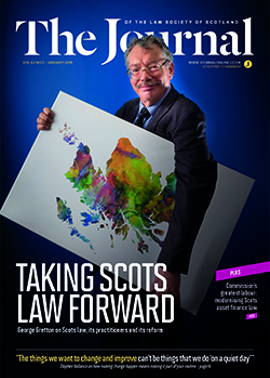Q & A corner
Q: What happens when a solicitor’s client account is arrested by a third party?
A: The Professional Practice Committee recently considered the potential impact on clients’ funds and on clients’ transactions where a third party lodges an arrestment order in the hands of a bank with which that solicitor’s business (“the firm”) holds both its own firm account and its clients’ account.
The committee has been advised that it is the policy of the clearing banks that when an arrestment order is served in the context of a third party’s claim or dispute against a firm, the bank may treat the arrestment as attaching not only to the firm’s own business account(s) but also any client account.
Banking practice means that when the arrestment order is received, the bank will look to the firm’s own business account(s), current and any deposit, in the first instance to cover the amount of the arrestment, but that if the sums so held are insufficient to cover the arrestment, the bank will look to the sums held in the client account. For the avoidance of any doubt, the Society has been reassured that banks will not take any action in respect of any specific named client account, for example “XXX account on behalf of Mrs McGlumpher” as opposed to “XXX client account”.
The banks’ position is that the balances held within many solicitors’ clients’ accounts contain elements of funds that are truly the firm’s own funds, such as where paid fees have been lodged in the clients’ account before being transferred to the firm’s account, or in circumstances where the firm in question operates a “float” within its clients’ account to avoid any risk of falling foul of the accounts rules. In cases such as those, the banks argue that they are obliged to safeguard all funds and apply the arrestment to all funds that actually belong to the firm, and that the bank cannot unilaterally determine what are truly the firm’s funds and what are truly clients’ funds.
In such circumstances where the arrestment has attached a clients’ account, it will then be for the firm, or perhaps its accountants, to satisfy the third party effecting the arrestment and the bank as to whether the arrestment attaching to the clients’ account has actually attached to any firm’s funds as opposed to clients’ funds. If the balance in the clients’ account belongs exclusively to the clients then it is likely that the arrestment should be capable of being released in relatively short order, although there could still be immense disruption to clients’ affairs and transactions pending any release of the arrestment in so far as relating to the clients’ account.
So in summary, an arrestment in the hands of a bank by a third party in a litigation by that third party against a firm is competent to attach a firm’s clients’ account in principle, but whether that arrestment affecting the clients’ account is effective in practice will depend entirely on whether the funds held within that clients’ account belong exclusively to the firm’s clients or whether they are the true property of the firm.
Sadly, the Society does not have a solution to the potential problems associated with the arrestment of a firm’s clients’ account, but it is hoped that drawing this issue to the attention of the profession may help navigate a path which would help to minimise disruption.
The Society has obtained an opinion from Professor Gerard Maher QC relating to the effect of an arrestment served on a bank in relation to a firm’s client account. A copy can be obtained from the Professional Practice team: profprac@lawscot.org.uk
In this issue
- Valuing loss of society: an elusive consistency
- Child maintenance: yet another DWP effort
- Trading futures
- Appeals and extracts: sticking to the rules
- Making the law work better (1)
- Reading for pleasure
- Opinion: Trish McLellan
- Book reviews
- Profile
- President's column
- 2018: keep up the momentum
- People on the move
- "One lifetime is not enough"
- Legally habit-forming
- Equality in service
- The Scottish draft Budget 2018-19: what happened?
- Legal software: has your supplier been bought out?
- Asset finance: time for reform
- Human trafficking from the defence perspective
- Contract law in flux
- The limits of appeal
- Attention media lawyers
- Disability: a new focus
- A tale of two Budgets
- System redesign
- 21st Century Bar rides again
- Scottish Solicitors' Discipline Tribunal
- Happy new year?
- Specialist accreditation scheme relaunches
- Public policy highlights
- Paralegal pointers
- Making the law work better
- At the cutting EDGE
- Confirmation declarations agreed
- Q & A corner
- Documents, data and the GDPR
- Ask Ash
- Appreciation: Ethel May Houston OBE






